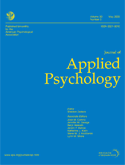
By Donald E. Conlon & William H. Ross (1993).
Journal of Applied Psychology, 78, 280-290.
Abstract
Two sources of third-party partisanship are: (1) the preexisting affiliation
a third party may have with the negotiators and (2) the overt support a
third party demonstrates by imposing an outcome. In two experiments,
subjects involved in a negotiation simulation were told prior to negotiation
that the third party was either positively affiliated with their side or
with their opponent's side. In both studies, third parties imposed
settlements on the disputants, reflecting varying degrees of overt support.
The results suggest that negative third-party affiliation reduced disputant
outcome expectations (thereby improving the likelihood of an agreement)
and led to enhanced ratings of outcome and third-party satisfaction relative
to favorable third-party affiliation. The results are consistent
with predictions made by both prospect theory and control theory.

Abstract Copyright (C) 1993 by the American Psychological Association.
Note that this abstract may not exactly replicate the final version published in the APA journal. The above abstract is not the 'copy of record.'
You may visit the home page of the Journal of Applied Psychology at the following URL: http://www.apa.org/journals/apl/